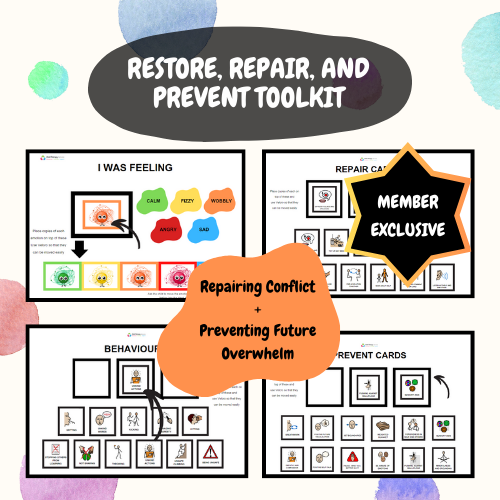Welcome to the Restore, Repair, and Prevent Toolkit
Restorative practices have emerged as a potent strategy for nurturing children’s well-being within educational settings. These practices, centered on empathy, communication, and conflict resolution, play a pivotal role in fostering emotional and social growth among students.
This innovative toolkit integrates principles from neuroscience and restorative justice, aiming to transform traditional behaviour management approaches. By focusing on restoring, repairing, and preventing conflict patterns, it empowers educators to cultivate a positive learning environment.
Aligned with the Bounce Framework, which promotes social and emotional regulation, this toolkit equips children with essential skills to understand and manage their thoughts, emotions, and behaviours effectively.
Developed with insights from Mountfield Heath School, an esteemed Outstanding Specialist Provision, this toolkit draws on best practices to support educators in implementing restorative strategies that promote empathy and accountability among students.
By embracing the Restore, Repair, and Prevent Toolkit, schools not only address behavioural challenges proactively but also nurture a culture of respect, collaboration, and emotional resilience among students.
With thanks to Mountfield Heath School, an Outstanding Specialist Provision for their inspiration in developing this pack.
This pack contains
- I was feeling …
- Visual behaviours
- Visual repair cards
- Visual prevent cards
- Final re-cap/review
Pack information
- Font: Arial
- Number of Pages: 18
- Format: High quality PDF file
Resource Pack Ideas
- Restorative Circles: Implement regular restorative circles where students and educators gather to discuss conflicts, concerns, and successes. Use structured prompts from the toolkit to facilitate open dialogue, promote empathy, and resolve issues collaboratively.
- Conflict Resolution Workshops: Conduct workshops using toolkit resources to teach students constructive conflict resolution strategies. Role-play scenarios where students practice active listening, expressing feelings, and finding mutually beneficial solutions.
- Peer Mediation: Train/Upskill selected students as peer mediators using the toolkit’s guidance and materials. These mediators can support their peers in resolving conflicts independently, fostering leadership skills and promoting a positive peer culture.
- Emotional Regulation Tools: Integrate tools from the toolkit that help students recognise their emotional triggers and regulate their responses. Provide visual aids, such as emotion cards to help students identify and communicate their feelings effectively.
Members
This is exclusive and FREE TO MEMBERS.
Want to know more about membership benefits? 👉 Click here





